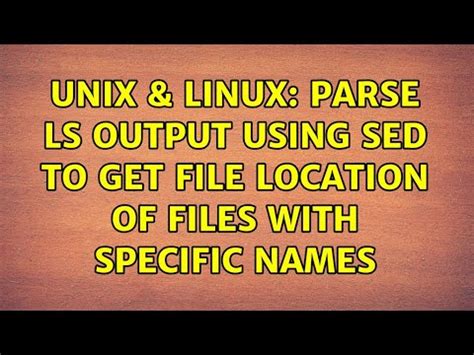It’s tempting to use the output of ls in your shell scripts because it’s straightforward and familiar. But the reality is that parsing the output of ls is a recipe for disaster. The primary reason is that `ls` output isn’t designed to be reliably parsed. Its layout can change based on user configurations, environment variables, and even the version of `ls` in use. This makes it highly unpredictable and likely to break scripts in unexpected ways.
One of the common arguments for using ls is its widespread availability and simplicity. GNU’s version of `ls` does have additional options like --dired specifically for Emacs Dired mode, but even this isn’t infallible. As some comments point out, tools like Emacs’ Dired have mechanisms to check whether `ls` supports the `–dired` option. However, this comes with its own set of complexities and potential issues. For example, if `ls` doesn’t support the `–dired` option, Dired will still function but might not properly handle filenames with unusual characters or special escape sequences, warning users with messages like ls does not support --dired; see dired-use-ls-dired for more details. This shows that even specialized use-cases involve multiple layers of checks and balances.
What should you use instead? Libraries or functions designed for file manipulation are far more reliable. For instance, in Unix-like systems, using C library functions like readdir and stat is a more robust approach. These functions handle filenames directly at the filesystem level, avoiding the pitfalls of text-based parsing. Similarly, in scripting languages like Python, the os and os.path modules provide high-level functions to list directories and retrieve file metadata. Here’s an example in Python that lists files in a directory:
import os
for entry in os.scandir('/your/directory'):
if entry.is_file():
print(entry.name)Not only is this more readable, but it’s also inherently more secure and portable across different environments.
Beyond the technical considerations, there’s a security aspect to this as well. Filenames can contain almost any character, including newlines, spaces, and other control characters. This might seem trivial, but it opens the door to various attack vectors, especially if the scripts are executed with elevated permissions. One comment succinctly points out that parsing filenames using `ls` is a weak point that can be exploited by attackers. Even a simple oversight in input verification can lead to significant vulnerabilities in your system. Thus, from a security standpoint, directly manipulating files via system calls or well-established libraries is a defense-in-depth measure.
One might argue that the likelihood of encountering malicious filenames might be low. However, the reality is that in a shared or public environment, the risk is far from negligible. Filenames with newlines or unusual characters might be rare in controlled settings, but attackers actively seek such edge cases to exploit. Having robust mechanisms to handle these scenarios is essential for maintaining system integrity. As one commenter wisely pointed out, “Klingons do not release software. Klingon software escapes, leaving a bloody trail of design engineers and quality assurance people in its path.” This mirrors the reality of picking up ‘quick and dirty’ solutions like parsing `ls` outputs, which might work initially but are bound to fail spectacularly under pressure.
In conclusion, avoid parsing the output of `ls` in your scripts whenever possible. Opt for more reliable and secure alternatives provided by the programming language or platform you’re using. This not only ensures better reliability and maintainability of your scripts but also fortifies your system against potential security threats. Remember, in software development and operations, taking the time to do things right initially will save you exponentially more time in the long run. For more detailed discussions and insights, you can visit the GNU Emacs Dired Manual here and the discussion on shell scripting in the publication ‘Advanced Bash-Scripting Guide’.


Leave a Reply